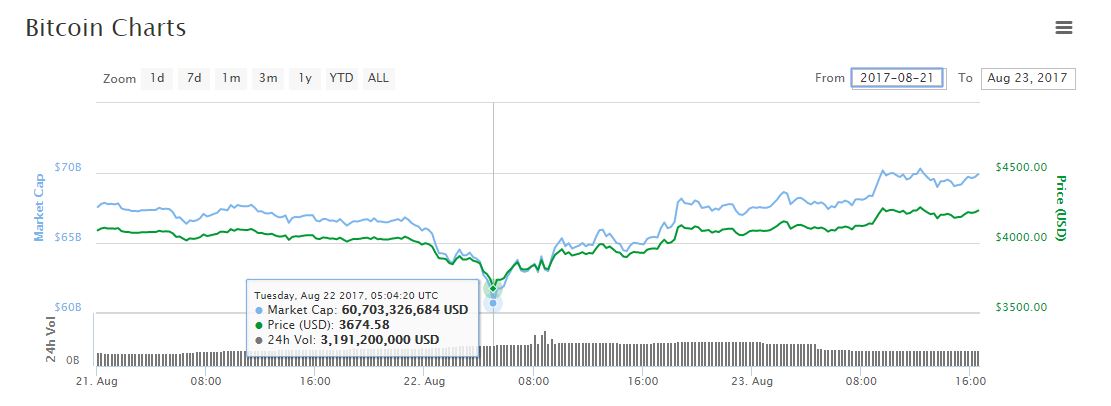The deputy governor of the South African Reserve Bank (SARB) has said that it would be ‘too risky‘ to start issuing its own digital currency.
Speaking at the Strate GIBS FinTech Innovation Conference 2017, Francois Groepe, the deputy governor of the South African Reserve Bank, commented on the development of a digital currency such as bitcoin. However, while bitcoin is gaining dominance, he stressed that the central bank needs to ensure that payment methods aren’t abused to fund money laundering or terrorism.
He noted, though, that digital currencies are becoming more recognised as people understand their concept.
As a result, he said that:
“Virtual currencies have the potential of becoming widely adopted. However, for the central bank to issue virtual currencies or cryptocurrencies in an open system will be too risky for us. This is something that we really need to think about.”
According to Groepe, though, the central bank has created a three-member team to look into how cryptocurrencies work. The bank is also expected to launch a digital currency sandbox to test how they function.
He also discussed the financial industry and how innovation is changing the sector, mainly through digital currencies.
He added:
“We are witnessing the disruption of financial services. Over the past decade or so, fintech’s attention and publicity has continued to intensify and increase. It is continuing to usher in completely new ways of banking. Developments in the fintech space are part of an evolutionary process driven by innovations.”
Bitcoin Dominates the Market
As of the 23th August bitcoin is trading at $4,239. This is a 6.93 percent increase in 24 hours, but a 0.08 drop in seven days. At press time, the digital currency’s market cap is worth over $70 billion.
Just yesterday, bitcoin’s price was listed at $3,674 as it underwent an early-week correction period. As a consequence, its market cap value dropped to $60.7 billion. However, this price rally has helped to push it back over the $4,000 mark. The recent drop in price is believed to be down to a hashrate shift from bitcoin to bitcoin cash.
According to a recent report, bitcoin cash surged to a new all-time high on the 19th August when it reached $914. Furthermore, the alternative to bitcoin was reported to have mined its first eight megabyte block, clearing nearly 40,000 transactions. According to data from Coin Dance, bitcoin cash had become 69 percent more profitable to mine than bitcoin.
Not only that, but concerns have been circulating the SegWit and SegWit2x debate, which may have pushed bitcoin’s price down.
Despite this, however, the number one currency is still the leader in the field. Ethereum, in second place, has a market cap worth $30.2 billion. Whereas, bitcoin cash, in third place, is valued at $10.9 billion. Nevertheless, fourth placed ripple is close behind with a market value amounting to $10.8 billion.
Are Fears Justified?
Considering the dominance that bitcoin is showing in the market, it’s may be surprising that South Africa’s central bank thinks it’s too risky to start issuing their own version.
Last August, it was reported that The Bank of England had issued its own digital currency. Known as the RSCoin, it shares similar traits to bitcoin such as being managed by the blockchain. However, one of its key differences is that it is centralised within The Bank of England. As a result, only one bank generates each unit of the digital currency.
The bank has keenly embraced the blockchain, which is evident in an excerpt from a quarterly bulletin. It says:
“… the key innovation of digital currencies is the ‘distributed ledger’ which allows a payment system to operate in an entirely decentralized way, without intermediaries such as banks.”
Not only that, but according to the U.K.’s central bank, they don’t see that digital currencies ‘pose a material risk to monetary or financial stability in the United Kingdom.’ However, it will continue to monitor developments in this area.
No doubt aware of how finance is changing, The Bank of England appear keen to maintain a hold on the sector even if that means issuing their own digital currency.
SARB Begins Testing Digital Currency Regulations
Yet, while South Africa’s bank may not be issuing its own cryptocurrency anytime soon, the bank has been discussing regulations for bitcoin.
As a result, SARB are reported to be having discussions with blockchain-based solutions provider Bankymoon. According to a report, the central bank and Bankymoon are to undertake an experiment to test regulations for the digital currency.
Both, however, are in the early stages of seeing where the partnership can go.
Loerien Gamaroff, CEO of Bankymoon, said:
“This is because the Reserve Bank is very hesitant to give a stamp of approval on anything that comes out. The sandbox will only be bitcoin focused during this initial phase, but is focused on applying broad regulations to all cryptocurrencies.”
He adds, though, that it will give a formal foundation to bitcoin, which people will be able to trust.
“I think the regulation will move things along and make people on the street comfortable with bitcoin. With these new regulations, these everyday people can now trust that bitcoin is not just for hackers and criminals.”
The bank has, in the past, expressed its interest in blockchain and digital currencies. So much so, that the bank’s governor stated that it was willing to consider the benefits that the technology could present.
At the time, Lesetja Kganyago, the governor of SARB, said:
“As a central bank, we are open to innovations despite the different opinions of regulators on matters such as cryptocurrencies. We are willing to consider the merits and risks of blockchain technology and other distributed ledgers.”
Taking Small Steps
It remains to be seen what’s next for the central bank. However, the bank has already made significant progress so far. The fact that it has started proceedings into the regulation of digital currencies is a step forward. Nothing is going to happen overnight, but these steps remain positive for the country, which is seeing an increasing number of people using bitcoin for day-to-day purchases.
Featured image from Shutterstock.


